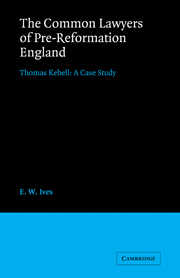Book contents
- Frontmatter
- Contents
- List of figures and tables
- Preface
- Abbreviations
- Manuscript sources
- Table of cases
- Introduction
- PART I THE LEGAL PROFESSION
- PART II LEGAL PRACTICE
- PART III THE LAWYERS AND THE LAW
- 9 The legal system
- 10 The crown and the profession
- 11 The interest of the state
- 12 A changing community
- PART IV THE PROFESSION AND SOCIETY
- Appendices
- Index
10 - The crown and the profession
Published online by Cambridge University Press: 05 November 2011
- Frontmatter
- Contents
- List of figures and tables
- Preface
- Abbreviations
- Manuscript sources
- Table of cases
- Introduction
- PART I THE LEGAL PROFESSION
- PART II LEGAL PRACTICE
- PART III THE LAWYERS AND THE LAW
- 9 The legal system
- 10 The crown and the profession
- 11 The interest of the state
- 12 A changing community
- PART IV THE PROFESSION AND SOCIETY
- Appendices
- Index
Summary
Without ‘the roote of Justice’, ‘the tree of comonwelth cannot contynew’, so wrote Edmund Dudley of Gray's Inn as he whiled away his long imprisonment in the Tower. ‘And this roote of justice must nedes come of our souereigne lord hym self, for the whole auctorite thereof is gyven to hym by God.’ The occasion was unusual but the sentiments commonplace. Forty years earlier, John Fortescue had quoted with approval the text, regis namque officium pugnare est bella populi sui, et eos rectissime iudicare, and a generation later, John Ponet would write that ‘thende’ of a king's authority ‘is determined and certain, to maintene iustice, to defende the innocent, to punishe the euil’. In the words of the oath offered to the monarch at his coronation,
You shall make to be done after your strength and power, equal and rightful justice in all your dooms and judgements and discretion, with mercy and truth.
The relationship between the king and law and justice, which was a commonplace at a metaphysical level, can also be looked at in historical and constitutional terms. English common law was, initially, the custom of the king's court, and the king's proprietorial interest continued long after this custom had come to be accepted as the common law of the realm. He was privileged at law, and the courts were always tender to his interests. In most cases the crown was not open to process except of grace, and the general principle was, le melior sera pris pur luy.
- Type
- Chapter
- Information
- The Common Lawyers of Pre-Reformation EnglandThomas Kebell: A Case Study, pp. 222 - 246Publisher: Cambridge University PressPrint publication year: 1983



